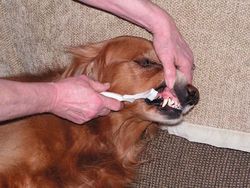
Home care is a very necessary part of keeping our pet’s teeth clean and healthy. Good quality home care along with regular dental cleanings can prevent the development of gingivitis and periodontal disease, and greatly help increase our pet’s quality of life.
 Daily brushing is by far the best way to prevent plaque and tartar buildup. It only takes three days for plaque to mineralize into tartar, and so daily homecare is essential to prevent tartar from developing. Special extra yummy toothpastes in beef, chicken, malt, or seafood flavour are used to help your doggy or kitty enjoy the experience. Human toothpaste can upset their stomach when swallowed, and should be avoided.
Daily brushing is by far the best way to prevent plaque and tartar buildup. It only takes three days for plaque to mineralize into tartar, and so daily homecare is essential to prevent tartar from developing. Special extra yummy toothpastes in beef, chicken, malt, or seafood flavour are used to help your doggy or kitty enjoy the experience. Human toothpaste can upset their stomach when swallowed, and should be avoided.
Dogs can be trained to accept brushing quite readily (cats too, but good luck). Start slowly, with just a few seconds of brushing, and immediately reward with a treat for good behaviour (you can give yourself a treat afterwards too for actually doing the brushing). Gradually over time, increase the length of the brushing sessions, until you can get in there and scrub away real good. By taking it slowly, and always rewarding good behaviour, your pet will soon look forward to their brushing ritual as their very favourite time of the day.
 If pets do not tolerate a toothbrush, there are dental wipes that can be used with your finger as a start. Some pets will tolerate this better and eventually you can try to build up to using a real brush.
If pets do not tolerate a toothbrush, there are dental wipes that can be used with your finger as a start. Some pets will tolerate this better and eventually you can try to build up to using a real brush.
Various dental diets are now available, which help decrease plaque and tartar accumulation far more than a regular dry food. Most dry foods shatter when chewed, and don’t have much of an abrasive action on the teeth. Dental diets are formulated as a larger kibble that must be chewed through multiple times in order to break it apart. Studies have shown these diets to be very effective.
Dental treats are also available that your pet chews to eliminate some of the dental plaque. Be careful of treats, as they can be high in calories — these calories must be considered when determining how much of your pet’s regular food should be fed daily.
 A note of caution must be exercised when choosing a dental treat for your pet. Some toys and treats marketed for good dental hygiene can actually be dangerous for your pet’s teeth. Bones, large knotted rawhides or any other hard substances should not be given to your pet — they could lead to dental fractures, which lead to an expensive visit to the veterinarian. Ain’t nobody got time for that! One good rule-of-thumb is the elbow rule: if you wouldn’t want someone to smack you real hard in the elbow with it, then it shouldn’t go into your pet’s mouth.
A note of caution must be exercised when choosing a dental treat for your pet. Some toys and treats marketed for good dental hygiene can actually be dangerous for your pet’s teeth. Bones, large knotted rawhides or any other hard substances should not be given to your pet — they could lead to dental fractures, which lead to an expensive visit to the veterinarian. Ain’t nobody got time for that! One good rule-of-thumb is the elbow rule: if you wouldn’t want someone to smack you real hard in the elbow with it, then it shouldn’t go into your pet’s mouth.
Tennis balls are another no-no. Balls are great, tennis balls – not so much. The rough felt surface over the ball acts like sandpaper on your dog’s teeth, gradually grinding them down over time. It’s not pretty.
Another newer addition to our homecare arsenal is a liquid that can be added to the daily drinking water. It is probably the least effective of all the options discussed, but also the easiest. When used in combination with the other methods above, it can be part of an effective dental home care program.
We would be more than happy to discuss all of these options with you in greater detail at any time, and to help you decide what types of dental home care would work best in your own particular situation.
.
